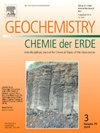Targeting porphyry Cu deposits in the Chahargonbad region of Iran: A joint application of deep belief networks and random forest techniques
IF 2.9
3区 地球科学
Q2 GEOCHEMISTRY & GEOPHYSICS
引用次数: 0
Abstract
Mineral prospectivity modeling (MPM) is a valid and progressively accepted predictive tool for mapping reproducible potential mineral exploration targets. In this study, a hybrid approach combining unsupervised deep belief networks with supervised random forest (DBN-RF) is performed to delineate potential exploration targets for porphyry Cu deposits in the Chahargonbad region of Iran. Firstly, a mineral system model for porphyry Cu deposits is established, and relevant targeting criteria are delineated based on comprehensive exploration datasets. Subsequently, within this hybrid framework, the DBN extracts deep implicit feature information, which is then utilized as input for the RF. The comparative results on the performance of the hybrid model and the RF model trained by the primary targeting criteria, in terms of the improved prediction-area plot, demonstrate that the DBN-RF prospectivity model outperformed the RF-generated model with an overall efficiency of 0.53. This hybrid model accurately identified 81.97 % of known Cu deposits within an investigation area of 18.03 %, with primary trends aligned with the primary faults and volcanic units of the region. This study demonstrates effective performance of DBN-RF in identifying exploration targets for porphyry Cu deposits at regional scale and also highlights the potential of deep learning-based methods for successful MPM.
瞄准伊朗 Chahargonbad 地区的斑岩铜矿床:深度信念网络和随机森林技术的联合应用
矿产远景建模(MPM)是一种有效且逐渐被接受的预测工具,用于绘制可重复的潜在矿产勘探目标图。本研究采用无监督深度信念网络与有监督随机森林(DBN-RF)相结合的混合方法,为伊朗 Chahargonbad 地区的斑岩铜矿床划定潜在勘探目标。首先,建立了斑岩铜矿床的矿物系统模型,并根据综合勘探数据集划定了相关的目标标准。随后,在此混合框架内,DBN 提取深层隐含特征信息,并将其作为 RF 的输入。从改进的预测面积图来看,混合模型与根据主要目标标准训练的射频模型的性能比较结果表明,DBN-RF 探矿模型的总体效率为 0.53,优于射频生成的模型。该混合模型在 18.03% 的调查区域内准确识别了 81.97% 的已知铜矿床,其主要趋势与该地区的主要断层和火山岩单元一致。这项研究证明了 DBN-RF 在区域范围内识别斑岩型铜矿床勘探目标的有效性能,同时也凸显了基于深度学习的方法在成功实现 MPM 方面的潜力。
本文章由计算机程序翻译,如有差异,请以英文原文为准。
求助全文
约1分钟内获得全文
求助全文
来源期刊

Chemie Der Erde-Geochemistry
地学-地球化学与地球物理
CiteScore
7.10
自引率
0.00%
发文量
40
审稿时长
3.0 months
期刊介绍:
GEOCHEMISTRY was founded as Chemie der Erde 1914 in Jena, and, hence, is one of the oldest journals for geochemistry-related topics.
GEOCHEMISTRY (formerly Chemie der Erde / Geochemistry) publishes original research papers, short communications, reviews of selected topics, and high-class invited review articles addressed at broad geosciences audience. Publications dealing with interdisciplinary questions are particularly welcome. Young scientists are especially encouraged to submit their work. Contributions will be published exclusively in English. The journal, through very personalized consultation and its worldwide distribution, offers entry into the world of international scientific communication, and promotes interdisciplinary discussion on chemical problems in a broad spectrum of geosciences.
The following topics are covered by the expertise of the members of the editorial board (see below):
-cosmochemistry, meteoritics-
igneous, metamorphic, and sedimentary petrology-
volcanology-
low & high temperature geochemistry-
experimental - theoretical - field related studies-
mineralogy - crystallography-
environmental geosciences-
archaeometry
 求助内容:
求助内容: 应助结果提醒方式:
应助结果提醒方式:


